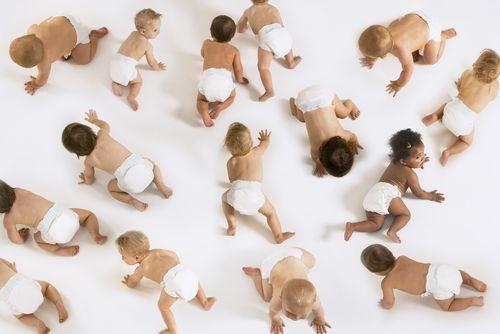Can Babies Be Racist? Infants Show Racial Bias Over Fairness When Choosing Playmates

Many parents try to raise their children to not discriminate against others based on race, especially since babies start noticing things like skin color as early as 6 months of age. Babies have proven to be fast learners, as they have better facial recognition skills and pick up on people's emotional expressions, especially of those from their same race. Although babies tend to choose a playmate, regardless of their skin color, who is fair in sharing toys equally, they also tend to show racial bias over fairness when it comes to choosing playmates. This could be due to favoring people who have the same characteristics as oneself, or a phenomenon known as “in-group bias,” according to a recent study published in the journal Frontiers in Psychology.
"It's surprising to see these pro-social traits of valuing fairness so early on, but at the same time, we're also seeing that babies have self-motivated concerns too," said Jessica Sommerville, lead author of the study and a University of Washington associate professor of psychology, according to Science Daily. By preschool, children have been found to show in-group bias concerning race, but Sommerville admits the results in infants have been mixed. By 15 months of age, infants are more sensitive to fairness norms and those who practice unfairness — visually validated by their experiences.
Sommerville and her team of researchers sought to investigate the extent to which race and fairness — a social tendency that infants appear to notice — played a role in determining who babies choose as playmates at 15 months. A total of two experiments were conducted using 40 white babies and a set of same ethnicity toy distributors and 80 white babies with a set of two different ethnic toy distributors — one white and one Asian.
In the first experiment, the researchers had the 40 white 15-month-old babies watch two white experimenters divide toys — one equally and the other unequally. When the babies had the chance to choose their playmates, 70 percent of the time they preferred the experimenter who distributed the toys fairly. The findings for this experiment highlighted when the individuals are of the same race as the infant, the babies will favor fair over unfair individuals as playmates. Knowing this, Sommerville and her colleagues then asked what would happen when individuals of the same race as the infant actually stood to benefit from bias.
Eighty white 15-month-old babies saw a fair and an unfair experimenter distribute toys to a white and to an Asian recipient in the second experiment. Half of the participants saw the unfair experimenter give more to the Asian participant, and the other half of the group saw the experimenter give more to the white participant. The findings showed infants seemed more tolerant of unfairness when the white recipient benefited from it, and therefore, they picked the fair experimenter less often when the unfair experiment had more toys compared to the white recipient and vice versa.
These experiments imply that babies could possibly take into account both race and social history when it comes to choosing a playmate. “If all babies care about is fairness, then they would always pick the fair distributor, but we’re also seeing that they’re interested in consequences for their own group members,” Sommerville said, The Telegraph reported. However, the findings do not suggest that babies are racist, but rather that they are biased to those of their own race. In fact, infants process information before they choose who to interact with, meaning they do not choose playmates based on a single dimension — such as being fair or unfair.
In a similar 2012 study, 9-month-old babies scored worse than white 5-month-old babies when it came to telling apart African-American adults. The 9-month-old babies were better able to recognize faces and emotional expressions of people who belong to the racial group they interacted with the most. At this age, babies have developed a racial bias, meaning they becoming more skillful at telling apart two faces within their own race. The brain activity of these group of infants showed specific pathways had been reinforced by practice decoding familiar faces, while other less-used pathways were not.
Overall, these studies help parents and teachers understand the nature of these racial bases to help reduce or eliminate them.
Sources:
Burns MP, Sommerville JA. “I pick you”: the impact of fairness and race on infants’ selection of social partners. Frontiers in Psychology. 2014.
Monesson A, Scott LS, Vogel M. Building biases in infancy: the influence of race on face and voice emotion matching. Developmental Science. 2012.
Published by Medicaldaily.com



























